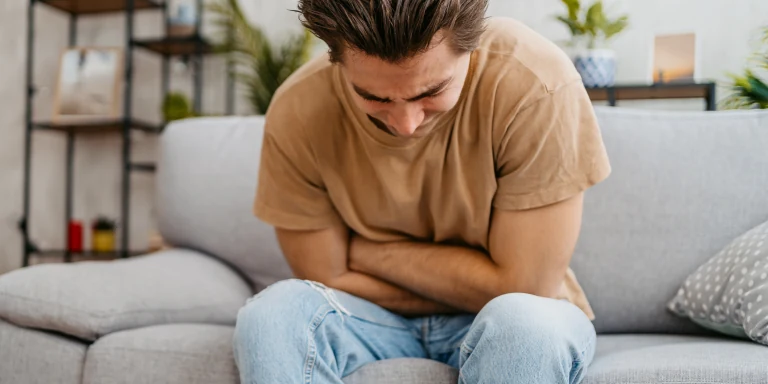
What helps combat abdominal cramps?
They can occur suddenly or recur at regular intervals. Find out here what helps with pain in the upper or lower abdomen.
Abdominal cramps are extremely unpleasant and can be very debilitating. Find out here what the most common causes of abdominal cramps are and what getting abdominal cramps after eating can signify. Fortunately, abdominal cramps can often be relieved with tried-and-tested home remedies such as herbal teas or a hot water bottle. The good news: abdominal cramps are often short-lived.
The most common causes of abdominal cramps
Abdominal cramps can have many causes, but diet and digestion are often the triggers for abdominal and stomach cramps. If you experience abdominal cramps for more than three days, visit your doctor.
Abdominal cramps during menstruation
Women sometimes experience lower abdominal cramps at the onset of their period. Period pain may result from the increased level of hormones in the body. Severe abdominal cramps in women can also be a possible sign of a gynaecological condition, such as endometriosis.
Abdominal cramps during ovulation
The increase in certain hormones, including luteinising hormone LH and progesterone, during ovulation can also cause cramping pain in the lower abdomen. Some women may even be able to localise the pain to the left or right ovary. Abdominal cramps at ovulation and abdominal cramps at implantation are quite common.
Abdominal cramps and nausea/vomiting
Sudden abdominal cramps and nausea are often due to a gastrointestinal infection, particularly if they occur in waves. An upset stomach, gastroenteritis or consuming contaminated food (food poisoning) can also cause the stomach to undergo cramping and make you vomit. These symptoms can be very severe, but they usually pass quickly.
Abdominal cramps and flatulence
Flatulence is not uncommon and can cause abdominal cramps if particularly intense. Exercise and home remedies such as dandelion can bring relief.
Abdominal cramps and constipation
There are many causes of constipation, including drinking too little water, eating high-protein foods and lack of exercise. These can cause food to remain in the large intestine for too long, where it can lead to uncomfortable and often painful constipation. This means that food and liquid then also remain in the stomach and small intestine for longer, which can lead to colic and abdominal cramps.
Abdominal cramps and diarrhoea
Sudden abdominal cramps and diarrhoea may be due to an infection of the gastrointestinal tract, food poisoning or a food intolerance.
Abdominal cramps after eating
Sharp or persistent abdominal cramps often occur after eating. When caused by food poisoning, they usually occur within one to two hours after consuming contaminated food. In most cases, other people who have eaten the same foods are also affected.
Abdominal cramps after fatty or spicy foods are also a common occurrence. These can occur with certain diet-related illnesses or intolerances such as histamine intolerance, gluten intolerance or also lactose intolerance. If you suspect that you suffer abdominal cramps after consuming certain foods – e.g. after eating raclette, garlic or drinking coffee – it is worth keeping a food diary.
In gastroenteritis, the main symptom, diarrhoea, is often accompanied by abdominal cramps. Vomiting and fever can also occur, which exacerbate the course of the illness. In rare cases, abdominal cramps accompanied by a sudden or high fever may also be triggered by an intestinal obstruction, appendicitis or gallstones.
Abdominal cramps – how best to combat them?
Abdominal cramps often occur suddenly and can severely impact on your life. There are several ways to relieve the symptoms.
Painkillers for abdominal cramps
Your pharmacist or general practitioner can advise you on medicines that help relieve abdominal cramps. They may be able to recommend or prescribe suitable medicines that have an antispasmodic or pain-relieving effect.
Home remedies for abdominal cramps
Home remedies can also help alleviate mild to moderate abdominal cramps. Proven home remedies for abdominal cramps include:
Herbal teas
Herbal teas can be an effective remedy for abdominal cramps. A cup of hot herbal tea can help relieve abdominal cramps: chamomile flowers, lemon balm leaves, peppermint, fennel, aniseed and dandelion have antispasmodic properties and are useful as a treatment for abdominal cramps.
Heat
Heat is relaxing – and can also help with abdominal cramps. Taking a hot bath or placing a hot water bottle or heated cherry-stone or millet pillow on the affected area can also bring relief.
Gentle massage
Gently massaging the abdominal area with a therapeutic oil can soothe abdominal cramps and also help relieve constipation and flatulence. Almond or olive oil are suitable for this purpose and you can also add one or two drops of an essential oil such as fennel, aniseed or lavender. Very gently massage the abdomen in a clockwise direction using circular movements. Important: seek advice at a chemist’s or pharmacy and only continue with the massage if you find it pleasant.
While abdominal cramps in the upper or lower abdomen can feel very debilitating, they are generally short-lived. Abdominal cramps during menstruation and abdominal pain after eating can be relieved by the use of home remedies such as herbal teas and heat. You should think about consulting your general practitioner if you suffer from acute abdominal cramps, very severe abdominal cramps or abdominal cramps that last for days.

The expert provided the editorial team with advice and input for this article. Sonja Signer (qualified nurse) works for the Helsana health consultation service. She helps customers on issues to do with prevention and health promotion.


Newsletter
Find out more about current health issues every month and get all the information you need about our attractive offers from all Helsana Group companies * delivered by e-mail to read whenever it suits you. Our newsletter is free of charge and you can sign up here:
We did not receive your information. Please try again later.
* The Helsana Group comprises Helsana Insurance Company Ltd, Helsana Supplementary Insurances Ltd and Helsana Accidents Ltd.